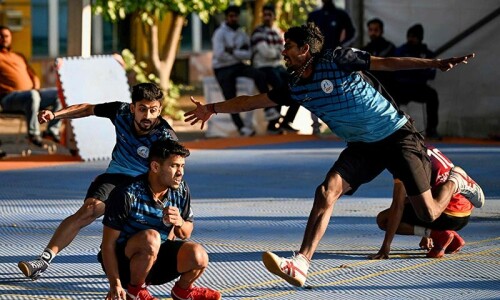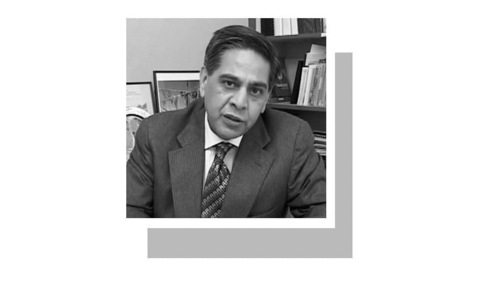
Clark Cook in his Foreword to A Drop: Lost in Time calls the poet, Syed Zaigham S. Jaffery, and others like him, “cultural repositories who carry forward the great traditions of national mentors like Iqbal.” Certain phrases that Jaffery uses are certainly reminiscent of popular lines from national poets like Faiz and Iqbal, while others seem to be translations of thoughts in Urdu. The first impression one gets on reading the collection is that the poet is not a native speaker of the English language, which results in a slight awkwardness of construction, and for the stickler of grammar, frequent slips. While using English as the medium for his work, he has also assimilated local imagery into it. He draws allusions and images from various parts of his life, which was spent largely in South Asia — Allahabad, Dhaka and Karachi — and partly in Hawaii. Jaffery’s poems present fragmented views of the various realities the author has experienced and, I suspect, imagined.
Written in free verse, the poems can be clustered thematically into three main foci: love for and duty to family, commitment to nation and faith, and a longing for love. The poems are divided into four sections, named, somewhat tritely, after the four elements: water, air, fire and earth.
Cook says the poems “came from the heart and mind and guts of a man with a complex personality built from a complex tension-filled past in a complex country built, in turn, from blood and war and sacrifice and fraught … with the daily threat of senseless terrorism and death.” This is reflected in the poems in the ‘Fire’ section which are intense, if disjointedly so. In ‘A Nation Fought Itself’, the tone is such that reader is not sure whether to be sympathetic about the tragedy or to hate the notion because of the high human cost of civil war.
A Drop: Lost in Time contains poetry that has a simplicity to it
Some of the poems have a sound premise and in others there are flashes of truly inspiring literary construction, but use of language and the choice of metre at times does not seem quite right. In ‘The Amaltas Tree and Me’ some of the allusions are exceedingly emotional, for instance, “all winter it suffered, but waited in silence, in pain like me”, while other lines are brilliant:
“Locate this tree, its flowers
scented songs do sing
I live in nectars’ (sic) of truth
with the tall Amaltas tree
all dressed in spring
for you to find me.”
The author uses the image of the Amaltas repeatedly through the poem which has strong ethnic connotations and brings forth a very potent image for a South Asian reader. The simple language and the images also help to add subtle details to the descriptions, thereby lending an almost nostalgic air to the writing, poor construction notwithstanding. Jaffery’s poetry, particularly the pieces on home and country, have an air of post-colonial nostalgia to them.
‘Body Urn Ageing’, another poem, has a simplicity to it, in both the language as well as the underlying message, though again, the language is clunky and does a disservice to the overall piece. While steeped in nostalgia, it also touches on the topic of a home left behind, indicative of the writer’s own expatriate experiences. There is also a sense of the inevitability of return, which seems to intertwine well with the nostalgic theme.

Another poem, ‘Smile Warmth’ is cohesive enough, detailing the musings of the poet on a wintry morning. The thought, however, is cursory and the crux of the poem is in the fourth stanza, “Many moons ago, eyes closed, you had smiled with me, rivers of warmth did flow”, which is not elaborated upon. While expressing an innately strong sentiment like love, and dealing with the sensation of lost love, the ideas could have been expressed more intensely so that they left a lasting impression on the reader.
In other poems, Jaffery manages to create memorable imagery, such as in ‘I Am What You Don’t See’ he writes:
“I am the river
In which torrents do flow …
I am the raging waters which keep
The banks apart”
Jaffery has also added a new dimension to his poems by applying a reverse ekphrasis to each piece. Typically, an ekphrastic poem is a vivid description of a work of art where a poet adds a reflective narrative to a painting or sculpture. For his book, Jaffery has had friends and colleagues from around the world give visual representations of each poem. Each of the 40 poems is accompanied by a painting, photograph, sketch or calligraphic text, which is a novel approach as it both amplifies a particular meaning of each poem while restricting exploration into other possible interpretations.
The reviewer is a development consultant and freelance journalist in Islamabad. She is also a Director of the School of International Law.
A Drop: Lost in Time
(POEMS)
By Syed Zaigham S. Jaffery
Topical, Lahore
ISBN: 978-9699251672
120pp.
Published in Dawn, Books & Authors, June 19th, 2016















































Dear visitor, the comments section is undergoing an overhaul and will return soon.